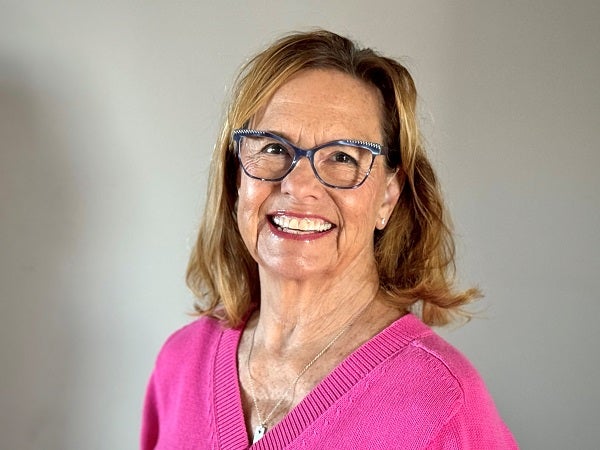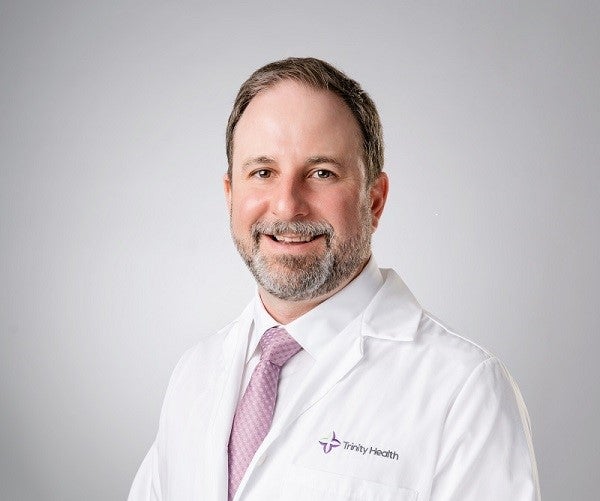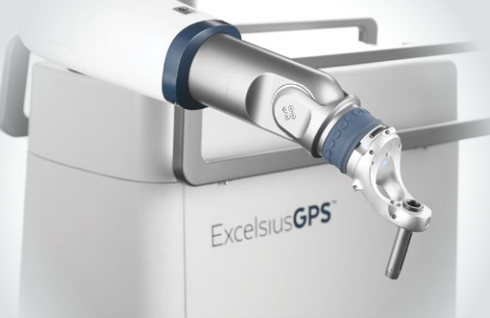Right Place, Right Time
December 18, 2024
By: Val Enti
Categories: Neurosciences (Brain Spine, Nerves)
Tags: Neurosurgery, Spine surgery, Robotic assisted spinal fusion
Sometimes timing is everything, and that was certainly the case for Debbie Reed. She was suffering from a failed fusion surgery on her spine in 2023 that left her unable to walk without extreme pain.
Debbie is an active person, and she just wanted to be able to “take a walk, enjoy nature, and smell the roses.” But after her spine surgery, she felt her life was over. That is when she asked her PCP for a referral to a different spine specialist.
The Right Time and Place Meanwhile, in April, 2023, neurosurgeon Robert Lynagh, DO, moved from Billings, Montana, to Muskegon, Michigan. Dr. Lynagh is recognized for his visionary leadership in bringing Globus Excelsius™ technology to Trinity Health Neuroscience Center – Muskegon in December 2023.
Meanwhile, in April, 2023, neurosurgeon Robert Lynagh, DO, moved from Billings, Montana, to Muskegon, Michigan. Dr. Lynagh is recognized for his visionary leadership in bringing Globus Excelsius™ technology to Trinity Health Neuroscience Center – Muskegon in December 2023.
This cutting-edge robotic navigation system is used for spine surgeries, enhancing precision and patient healing. Trinity Health Muskegon is the only hospital in West Michigan with this technology.
Debbie first saw Dr. Lynagh in March 2024, and she liked him right away.
“I did some homework before meeting him,” she said. “There was a doctor from Montana on LinkedIn, who wrote, ‘Trinity, you are so lucky to have Dr. Lynagh.’ That made a big difference to me. And one of Dr. Lynagh’s staff shared with me that she and her husband decided to ‘follow’ Dr. Lynagh from Montana to Michigan so she could ‘continue to work with the best.’ I trusted him immediately.”
When Debbie spoke to Dr. Lynagh about robotic surgery — his expertise, and experience from using the technology previously in Montana, and now in Muskegon —put her at ease.
“I met Dr. Lynagh at his office at Trinity Health Medical Group, Neurosurgery — Sherman Pavilion. I noticed that he was sitting on a stool — not typing on the computer. He had already seen my X-rays, and he spoke calmly to me. He explained what he was going to do and why. He really listens and is so encouraging.”
Debbie shared that Dr. Lynagh wasn’t jumping to surgery as a first treatment. He wanted to run tests and see if other treatments would relieve her pain.
“There was loose hardware from the previous surgery and incomplete fusions,” said Dr. Lynagh. “Debbie had residual stenosis that was pinching a nerve that was causing symptoms of pain, numbness, tingling, and weakness. She had a lot of back pain and other issues, such as scoliosis,” he explained.
“My process involves looking at imaging, but that is just part of making a full surgical plan. There is careful discussion with the patient and a careful examination — sometimes with diagnostic injections.”
This process often reveals other issues the patient has that he needs to address during a surgery.
“He is very careful about doing the right thing,” Debbie said. “It’s not about him or his ego — it’s about making sure to do what’s best for the patient. He is very humble.”
In the end, robotic surgery was Debbie’s best option. It was scheduled for Sept. 18, 2024.
Innovative Technology Plus Teamwork
Dr. Lynagh performed revision surgery on Debbie using Muskegon’s new robotic system. Its benefits are many.
“Spine surgeries are long. With ExcelsiusGPS there is less stress on the surgeon because the operation can be planned in advance and there is great confidence in the robot’s accuracy. The reduced stress leaves me fresh for the more intricate parts of the case. A specialized CAT scan taken preoperatively loads into the robot software. This allows for pre-planning of the surgery. An X-ray at the time of surgery is also incorporated into the robotic system. With these combined features, robotic navigation, similar to GPS in a car, helps eliminate user error. The level of accuracy is greater,” Dr. Lynagh explained.
The benefits to the patient are also considerable. The patient typically experiences:
• Less blood loss
• Less tissue disruption
• Less post-operative pain
• Shorter hospital stays
• Smaller incisions possibly leading to smaller scars
Debbie’s Prognosis
“Debbie’s prognosis is very good,” said Dr. Lynagh. “Following surgery, we gave her multimodality pain medications that included anti-inflammatories, nerve medications, and muscle relaxers that were tapered over time. Typically, patients are completely off them by three months or much earlier in smaller surgeries.”
Physical therapy follows surgery, and it is scheduled for patients in 6-week timeframes when the patient is ready for this step. Debbie also sees Dr. Lynagh every two months for follow-up care.
“Surgery is just the beginning of the healing process. Full healing of a bone fusion can take up to one to two years,” said Dr. Lynagh.
The best candidates for this state-of-the-art robotic surgery are patients who need a spinal fusion procedure. This technology can also be used for classic spinal navigation, where the robot finds the safest corridor to decompress a nerve in a patient with irregular anatomy. Patients need a referral from their PCPs to see a spinal specialist.
Over and Above
“Dr. Lynagh said he would take good care of me, and he did,” said Debbie. “He really believes in his team. The nursing care was fabulous. From the medical assistant to the nurses and PA, everyone went over and above to take good care of me.”
Debbie says that surgery at Trinity Health was like night and day compared to her first surgery. On the third day following surgery, her pain was gone in her back!
“I even gained an inch in height,” she said about Dr. Lynagh’s correction of her scoliosis. “They made me straight again! I would refer anyone with back pain to Dr. Lynagh. My kids and husband see how different I am. Dr. Lynagh saved my life. I am so grateful.”
To learn more about back, neck and spine care at Trinity Health, and our nationally recognized spine surgery program, visit our website.
Check out these interviews with Debbie and Dr. Lynagh:
TV – Fox 17 News at 11 pm
TV – WZZM 13 News at 6 pm



